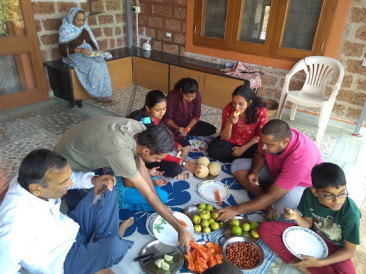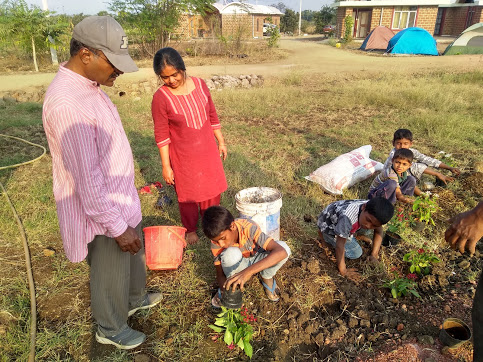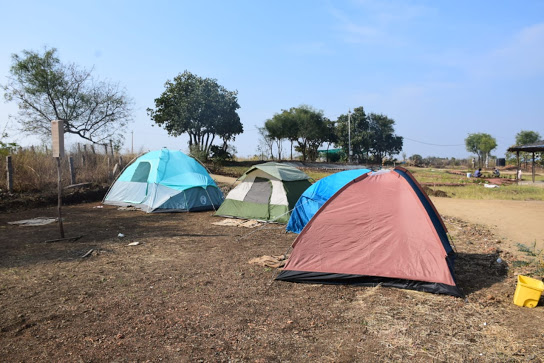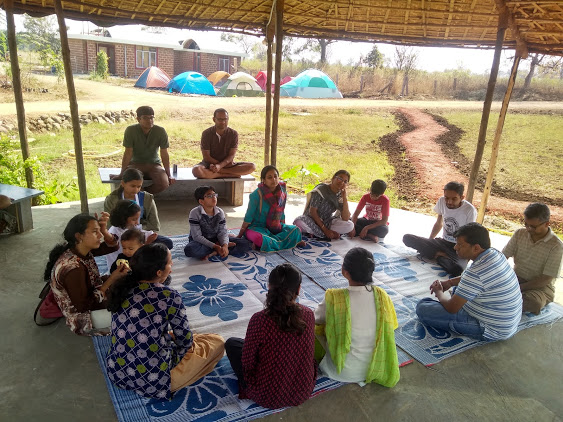Anahad, A Heart-Life Institute In The Making
How many ex-Microsoft employees are needed to light-bulb the change?
The answer: Two.
The catch? The two must be brothers!
.jpg) This is a story of two brothers, their family and friends and a bold experiment that people like Mahatma Gandhi and Margaret Mead would have been happy about.
This is a story of two brothers, their family and friends and a bold experiment that people like Mahatma Gandhi and Margaret Mead would have been happy about.
Abid Ali and Shabbar Hussain grew up in a middle class Indian family. Like many smart kids they became software engineers, became star performers at Microsoft, got married, had kids, built homes, nurtured friends... and thought that they were well on their way to becoming success stories in "Rising India".
However, influences like an incredibly compassionate mother, an intellectual and strict father, a family tragedy, random readings and meetings with some unique people had sown some potent seeds in them. Respecting their privacy and not to undermine an inspiring autobiography in the future, I don't want to get into more details about the nature of those seeds.
These seeds had taken roots and started sprouting here and there in their thoughts, speech and actions. Through the lenses of human values, sustainability and spirituality, they started pondering over the nature of their success. This led to questioning their way of life and to exploring ideas, people and places that showed another way of life. They were exploring the possibility of a way of life that may have struggles but is free of conflicts. That may hurt the ego but creates harmony. That may reduce monetary wealth but creates many other forms of wealth in abundance.
Abid has a sharp mind that is supported by his big heart. Shabbar has a big heart that is supported by his sharp mind. They are heirlooms true to their parents and hence their inability to adopt a hybrid life. So they decided to restart and redesign their lives from scratch.
.jpg)
After a lot of scouting, they bought a farmland an hour away from Hyderabad. In one and a half years, there are five families that includes cousins and friends, living in the farm in beautiful eco-friendly homes. They farmschool their kids, have adopted permaculture style farming, learn and practice a medicine-free, nature-driven health system, conduct residential workshops on education, health and right livelihood and have even launched a social enterprise that builds green homes. They call their farm Anahad - the unstruck sound/music. It is derived from the word that denotes the heart-chakra, Anahata. Inspired by them, already many individuals and families have started exploring similar lifestyle with their assistance.

Having shifted to a farm life ten years ago, I have come across dozens of people aspiring to make a shift to a meaningful and harmonious life. Only a small percentage of them are able to actually make the shift and that too mostly as a single family. So how did Anahad come into existence, from an idea to a small community-in-a-farm, in about three years?
Like most others, they too had done a lot of readings, traveled to meet many people who are great examples, attended workshops, did courses and dialogued and debated through countless nights. These are necessary but not sufficient.
What seems to have guided and accelerated their journey can be found in the "catch" mentioned in the beginning of the article: they are brothers.
No two people have ever become brothers by virtue of birth alone. In fact, in many cases, being born in the same family tends to create conflicts and estrangement.
I don't know how it had happened, but I am guessing that at some point, Abid and Shabbar must have become aware of what they could mean to each other and what they could do with each other. Unconsciously and consciously they are enabling whoever they touch to imbibe this spirit of brotherhood. This, I believe, is their greatest contribution to themselves and others so far. And will be perhaps long into the future.
It is their capacity for unconditional love and service that has helped them withstand every kind of struggle that they have gone through in setting up Anahad. Not that they exercise their full capacity all the time. They fall short, hurt themselves and others and lose valuable time and resources - just like anyone else attempting radical change. Not to mention a life threatening farm fire, highly poisonous vipers inside the home, dangerous falls during construction, a dysfunctional local government and their "services". But their music swells up unstruck from their hearts. It is Anahad.

Usually a theory comes first in the form of a book and if it becomes successful, a field-guide to implement the theory comes next.
At Anahad, the field has come up first. Their field guide is getting shaped, example by example. Their homes are made of laterite stone with no plastering and Wardha roofs with no concreting. The workers who built their homes are now owners of a Green Construction social enterprise. They harvest rain water and keep planting many trees. Their kids learn from playing and working, not from a syllabus. They seek out knowledge in all areas of sustainable living and offer their space as a learning center for everyone to learn and teach. Currently there is a software being developed and part of the business plan is avoid fundraising but to make social investors come to them. They are also heartstorming on how to make every neighbour, worker and volunteer a partner and perhaps a member of their community.

This is the kind of experiment that Gandhi hoped for to happen all over rural India. This is what Margret Mead believed can happen when a small of group of people come together. Anahad is a living institution in the making and I am happy to be part of the chorus in their orchestra.

One more thing: Two compassionate, brilliant and enterprising women, named Fatima and Fatema, married Abid and Shabbar respectively, many moons ago. How they managed to extract sanity out of the brothers and enabled the creation of Anahad is another story worth exploring.
Posted by Ragunath Padmanabhan on Oct 1, 2019
SHARE YOUR REFLECTION
12 Past Reflections


On Sep 30, 2019 Sunil Mor wrote:
Be like the sun for grace and mercy.
Be like the night to cover others faults.
Be like running water for generosity.
Be like death for rage and anger.
Be like the earth for modesty.
Appear as you are. Be as you appear. --Rumi

On Sep 30, 2019 Abid wrote:

On Oct 2, 2019 Sachi Maniar wrote:

On Oct 2, 2019 Nipun Mehta wrote:
And Abiddaaa, now we can't wait for the autobiography. :)

On Oct 2, 2019 Shabbar wrote:

On Oct 3, 2019 Sourabh Agrawal wrote:

On Dec 3, 2019 Vinod Eshwer wrote:
Abid, shabbar and Fatema! You wonderful people are a wale up call to folks like me pondering over the shift for a long long time.

On Dec 30, 2019 Hardeep Singh wrote:
I am presently looking for someone to guide me on this... would also like to visit this place too.
Who to connect to on this? please suggest.
I can be reached @9873664583 and hardeep.delhi@gmail.com.

On Apr 10, 2020 Anup wrote:
I had the good fortune and opportunity to attend a 5 days NC (Nature Cure) camp here during the last week of February this year, 2020 with Dr Arun Sharma and bunch of 30 odd NC enthusiats and was pleasantly surprised by hospitality and objectives & future plans of the Project Anahad_space ...
My best wishes and full support every respect as volunteer and otherwise ...

On Jun 4, 2023 Ankita wrote:
Thank you Ragu for bringing the story of the 2 brothers and the intentional community to us. The space and vision sound beautiful. I am in awe to see entire families move to such a space, living in permaculture and home schooling - in today's modern age and city dwellings, materialism and capitalism.
Look forward to visiting the space and connecting with the founding team, learning about this side of life - higher quality of life QOL lifestyle.

On May 25, 2024 Radha wrote:
Anhad
This is a truly amazing feat that both the brothers and their families together have achieved. To go off track ( so called modern living) and pave a completely unthought of path ,which is a light at the end of a dark tunnel! They are truly living an independent life and are shining examples of making the impossible possible. Their efforts come from conviction, determination and perseverance. They definitely have created the ripples and I do believe that it will create waves in the near future. I have read about them and watched the videos that showcase their unique work. Looking forward to visiting the place asap! Thank you Raghu Anna for sharing the story. My gratitude. Namaskaram


On Sep 30, 2019 Trupti Pandya wrote:
Post Your Reply